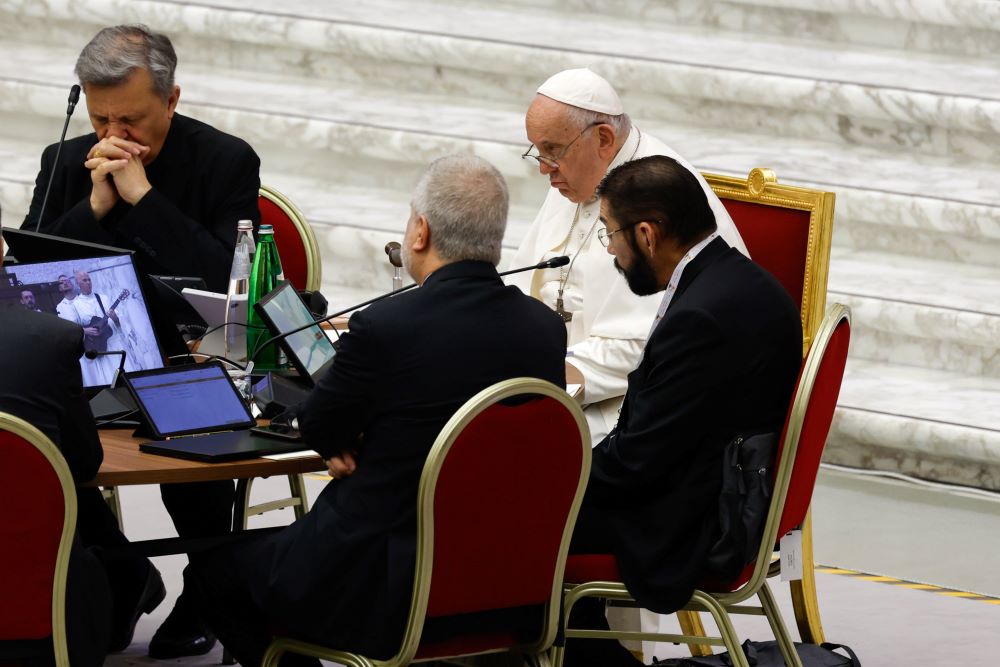
Pope Francis joins leaders of the assembly of the Synod of Bishops for prayer before a working session in the Vatican's Paul VI Audience Hall Oct. 20, 2023. Bishop Daniel Flores of Brownsville, Texas, the lead coordinator of the U.S. bishops' consultation process for the synod, is seen to the right of the pope. (CNS/Lola Gomez)
As Pope Francis prepares to host the second of two major summits on the future of the Catholic Church later in 2024, the U.S. bishops' conference is asking American dioceses to hold local listening sessions in early spring.
According to new Jan. 2 guidance obtained by NCR, the synod team at the national conference is asking U.S. bishops to hold two to three such listening sessions in order to address questions focused on the involvement of laypeople at every level of the global Catholic Church's organizational structure.
This new preparation is part of the lead-up to the next Vatican assembly of the Synod of Bishops, to be held in October 2024. It follows the October 2023 assembly, which ended with the release of a synthesis report that made 81 proposals for changes in the global church and also called for further study or evaluation on other issues at least 20 times.
The new guidance gives American dioceses until April 8 to submit to the U.S. bishops' conference a three- to five-page report about their spring listening sessions. Those reports will be synthesized regionally, then nationally, and a national report will be sent to the Vatican synod office by May 15, the guidance says.
Advertisement
The guidance, which was created based on a Dec. 11 communication from the Vatican's synod office, includes two specific questions for dioceses to ask during the listening sessions:
- "Where have I seen or experienced successes—and distresses—within the Church’s structure(s)/organization/leadership/life that encourage or hinder the mission?" and,
- "How can the structures and organization of the Church help all the baptized to respond to the call to proclaim the Gospel and to live as a community of love and mercy in Christ?"
The Vatican's guidance that shaped these questions incorporates four questions:
- "How can we enhance the differentiated co-responsibility in the mission of all the members of the People of God?";
- "What ways of relating, structures, processes of discernment and decision-making with regard to mission make it possible to recognise, shape, and promote co-responsibility?";
- "What ministries and participatory bodies can be renewed or introduced to better express this co-responsibility?" and,
- "How can these relations be creatively articulated in order to find 'a dynamic balance between the dimension of the Church as a whole and its local roots?' "
For the listening sessions, the U.S. bishops' conference recommends that dioceses reach out to voices that, in their earlier consultations, may not have been heard or were underrepresented. It also suggests collaboration with Catholic schools, colleges, nonprofits and health care facilities.
In terms of creating their reports, the conference encourages dioceses to include quotations and to "focus upon the voices of the People of God." Dioceses also have the option of adding an extra two pages about any best practices of synodality they may have developed, which the conference says it will forward directly to the Vatican.
The bishops' public affairs office did not immediately respond to NCR's request for further comment on the guidance.
The conference guidance also links to a Vatican worksheet "to assist with receiving the fruits of the October assembly and to continue on a path of conversion in the local churches."
The worksheet encourages readers to choose three concrete initiatives from the proposals in last October's synod synthesis report to implement locally.
Other suggestions from the worksheet include publicizing the work of last October's assembly; training facilitators in the synodal method of "conversation in the Spirit;" listening to priests and those on the periphery; convening a commission of theologians, canon lawyers and pastoral leaders to discuss the open questions from the synod in relation to local issues; and, involving local pastoral councils "in the discernments to be made in preparation for the next session."
The U.S. bishops' conference says it also will conduct consultations at the national level with a focus on participation, social justice issues and vocations promotion.
In his letter sharing the guidance, Brownsville, Texas, Bishop Daniel Flores, who is the lead coordinator of the U.S. bishops' consultation process for the synod, wrote, "We all know time is short, but even modest efforts at the local level can bear much fruit. Let us do what we can, as well as we can and trust the Lord to accomplish beyond what we can foresee."







